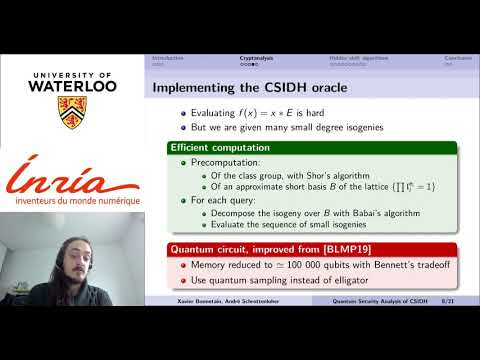CryptoDB
Quantum Security Analysis of CSIDH
| Authors: |
|
|---|---|
| Download: |
|
| Conference: | EUROCRYPT 2020 |
| Abstract: | CSIDH is a recent proposal for post-quantum non-interactive key-exchange, based on supersingular elliptic curve isogenies. It is similar in design to a previous scheme by Couveignes, Rostovtsev and Stolbunov, but aims at an improved balance between efficiency and security. In the proposal, the authors suggest concrete parameters in order to meet some desired levels of quantum security. These parameters are based on the hardness of recovering a hidden isogeny between two elliptic curves, using a quantum subexponential algorithm of Childs, Jao and Soukharev. This algorithm combines two building blocks: first, a quantum algorithm for recovering a hidden shift in a commutative group. Second, a computation in superposition of all isogenies originating from a given curve, which the algorithm calls as a black box. In this paper, we give a comprehensive security analysis of CSIDH. Our first step is to revisit three quantum algorithms for the abelian hidden shift problem from the perspective of non-asymptotic cost, with trade-offs between their quantum and classical complexities. Second, we complete the non-asymptotic study of the black box in the hidden shift algorithm. We give a quantum procedure that evaluates CSIDH-512 using less than 40~000 logical qubits. This allows us to show that the parameters proposed by the authors of CSIDH do not meet their expected quantum security. |
Video from EUROCRYPT 2020
BibTeX
@inproceedings{eurocrypt-2020-30224,
title={Quantum Security Analysis of CSIDH},
booktitle={39th Annual International Conference on the Theory and Applications of Cryptographic Techniques, Zagreb, Croatia, May 10–14, 2020, Proceedings},
series={Lecture Notes in Computer Science},
publisher={Springer},
keywords={Post-quantum cryptography;isogeny-based cryptography;quantum cryptanalysis;quantum circuits;hidden shift problem},
volume={12105},
doi={10.1007/978-3-030-45724-2_17},
author={Xavier Bonnetain and André Schrottenloher},
year=2020
}

